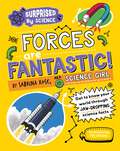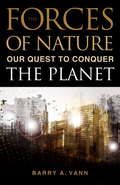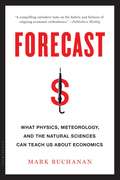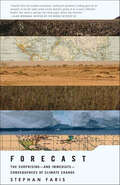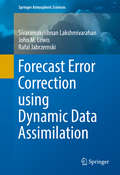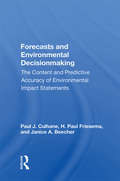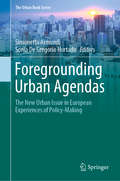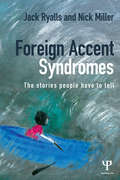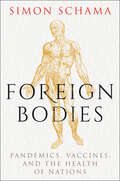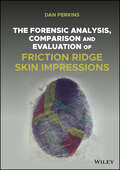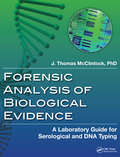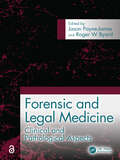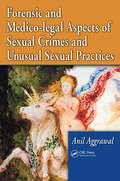- Table View
- List View
Forces are Fantastic! (Surprised by Science #3)
by Sabrina Rose Science GirlBe surprised by the astonishing science of forces, with Sabrina Rose, AKA Science Girl, the internet's most inspiring curator of facts and observations of our wonderful world - making it easy for all readers to come to love science!Surprised by Science: Forces are Fantastic brings an attention-grabbing and accessible set of facts about forces and physics to life! Doing what she's famous for online, Sabrina Rose dives into the most surprising details of the world of forces to explore the science at work. From black holes to gravity in space; from magnets in navigation to friction in storms - this series is perfect for inquisitive children age 7 and up, and all fans of Science Girl.Surprised by Science is a series of books that takes the inspiring communication and research skills of Science Girl's hugely popular platform and distills it on the page, with funny and engaging illustrations by Pipi Sposito paired with photos of the real-life science in action. The series includes: Electricity is Epic!; Plants are Powerful!; Forces are Fantastic!; Sound is Sensational!; Animals are Awesome!; Human Bodies are Brilliant!
Forces in Motion Physical Science
by Martin E. LeeThe book reviews physics fundamentals on force and motion. You will learn that in physics there are simple movements and complex movements and in order to understand motion, you have to think about forces, acceleration, energy, work, and mass.
Forces Make Things Move
by Kimberly Brubaker BradleyForces are at work all around you. They affect things as small as a toy car and as big as the earth! Forces make things move, but they also make things stop. Some forces are very strong, but other forces are so weak, you can't feel them at all. But what are forces, and how do they work? Read and find out!
Forces of Nature
by Barry A. VannThis illuminating overview of human population shifts and their precarious relationship with climate change and geography brings a unique perspective to understanding our age-old natural desire to inhabit picturesque landscapes or to transform once-desolate areas into new gardens of growth, all the while confronted by the dangerous, often life-threatening natural events that test our endurance. The author takes us on a journey along the ancient migration routes of our earliest ancestors and examines why many chose to settle in natural utopias with ample water; lush, fertile lands; and a moderate climate, while others were forced to make the most of far less inviting surroundings. Today, populations still shift. Some people migrate for devoutly religious reasons--outgrowing their surroundings, they move to the next available area, seeking a better life and spreading their religion--potentially instigating social conflict. We also now migrate in order to fulfill our wants and needs. Instead of settling near sources of water as a means for growth and survival, we seek out waterfront areas for their appealing landscape, though these spaces are already teeming with people. In contrast, many others are willing to move to new areas, no matter how inhospitable the clime, to earn a living. While there is still no technology that can protect vulnerable groups against the threatening features of the natural world, this book offers suggestions for how we can better adapt to challenging environments.
Ford Methods and the Ford Shops
by Horace Lucian Arnold Fay Leone FauroteIn "Ford Methods and the Ford Shops," Horace Lucian Arnold and Fay Leone Faurote provide a comprehensive and detailed exploration of the innovative production techniques and organizational practices that revolutionized the automotive industry. This seminal work offers an in-depth look at the methods that made the Ford Motor Company an industrial powerhouse and a symbol of modern manufacturing efficiency.The book meticulously documents the pioneering assembly line techniques introduced by Henry Ford, which dramatically increased productivity and lowered costs. Arnold and Faurote delve into the various aspects of Ford’s production system, from the design of specialized machinery and tools to the layout and operation of the assembly line itself.Key themes include:The Assembly Line: The authors provide a detailed analysis of the assembly line process, explaining how it transformed manufacturing by breaking down complex tasks into simple, repetitive actions. This innovation not only sped up production but also made it possible to produce affordable automobiles for the masses.Standardization and Efficiency: Arnold and Faurote explore the importance of standardization in Ford’s production methods. They discuss how interchangeable parts and standardized processes contributed to efficiency and quality control.Workforce Management: The book examines Ford’s approach to workforce management, including the introduction of higher wages and shorter working hours. These practices not only improved worker satisfaction but also increased productivity and reduced turnover.Business Philosophy: "Ford Methods and the Ford Shops" also delves into Henry Ford’s broader business philosophy, emphasizing his belief in making products affordable and accessible while maintaining high standards of quality and efficiency.This detailed and insightful book is a valuable resource for students of industrial engineering, business professionals, and anyone interested in the history of manufacturing. Arnold and Faurote’s comprehensive account of Ford’s methods provides a fascinating look at the principles and practices that reshaped the industrial landscape and set new standards for efficiency and innovation.
Forebrain Atlas of the Short-tailed Fruit Bat, Carollia perspicillata
by Jason Scalia Mark Stewart Frank Scalia Rena Orman John J Rasweiler IVThe Forebrain Atlas of the Short-tailed Fruit Bat, Carollia perpicillata, is unique among brain atlases. Not only is this the first quality atlas treatment of a bat species, but the atlas is also unique in its use of NeuN staining. Carollia perpicillata, a tropical species, is the only bat that has essentially been domesticated and can be maintained and propagated in a research environment utilizing simple, inexpensive husbandry procedures. The NeuN preparations used in this atlas selectively stain neurons in a sharp black coloration that fills not only the cell body but extends a short distance along the proximal dendrites. Thus, as distinct from the traditional nissl stains, which generate a shade of blue largely restricted to the cell body, the NeuN generates a quasi Golgi-like image of the neurons. This provides a more intimate view of the neurons than can be obtained from nissl staining. In addition, the background is essentially white, facilitating high-contrast photography and allowing for gray-tone illustration without any loss of information. The NeuN procedure does not stain axons, and since it does not stain glial cells or their nuclei, the noise ordinarily generated in nissl stains by the presence of glial cells among the neurons and in the white matter is entirely eliminated. The Forebrain Atlas of the Short-tailed Fruit Bat also includes nissl stained sections for two reasons: One, since some readers may be unfamiliar with the NeuN images, it is useful to include familiar images for comparison. More importantly, it is known that NeuN is not expressed in certain neurons, such as Purkinje cells, olfactory bulb mitral cells, and the cells of the paraventricular and supraoptic nuclei. The nissl stained sections are thus included to provide complementary views of such structures. The atlas will be useful for students and investigators doing neuroscience research on bat and other mammalian species, as well as students of comparative biology, zoology, brain evolution, and the history of neuroanatomical analysis.
Forecast: What Physics, Meteorology, And The Natural Sciences Can Teach Us About Economics
by Mark BuchananPositive feedback--when A produces B, which in turn produces even more A--drives not only abrupt climate changes, but also the most important and disruptive events in economics and finance, from asset bubbles to debt crises, bank runs, even corporate corruption. But economists, with few exceptions, have ignored this reality for fifty years, holding onto the unreasonable belief in the wisdom of the market. It's past time to be asking how do markets really work? Can we replace economic magical thinking with a better means of predicting what the financial future holds, in order to prepare for, or even avoid the next extreme economic event? <P> In Forecast, physicist and acclaimed science writer Mark Buchanan answers these questions and more in building a new model for economics, one that accepts that markets act much like the weather does. While centuries of classical financial thought has trained us to understand "the market" as something that always returns to equilibrium, economies work more like our atmosphere--a loose surface balance riding on a deeper torrent of fluctuation. Market instability is as natural--and dangerous--as a prairie twister. With Buchanan's help, we can better govern the markets and weather their storms.
Forecast: The Surprising—and Immediate—Consequences of Climate Change
by Stephan FarisA vivid and illuminating portrayal of the surprising ways that climate change will affect the world in the near future—politically, economically, and culturallyWhile reporting just outside of Darfur, Stephan Faris discovered that climate change was at the root of that conflict, and began to wonder what current and impending—and largely unanticipated—crises such changes have in store for the world. Forecast provides the answers.Global warming will spur the spread of many diseases. Italy has already experienced its first climate-change epidemic of a tropical disease, and malaria is gaining ground in Africa. The warming world will shift huge populations and potentially redraw political alliances around the globe, driving environmentalists into the hands of anti-immigrant groups. America's coasts are already more difficult places to live as increasing insurance rates make the Gulf Coast and other gorgeous spots prohibitively expensive. Crops will fail in previously lush places and thrive in some formerly barren zones, altering huge industries and remaking traditions. Water scarcity in India and Pakistan have the potential to inflame the conflict in Kashmir to unprecedented levels and draw the United States into the troubles there, and elsewhere.Told through the narratives of current, past, and future events, the result of astonishingly wide travel and reporting, Forecast is a powerful, gracefully written, eye-opening account of this most urgent issue and how it has altered and will alter our world.
Forecast Error Correction using Dynamic Data Assimilation
by Sivaramakrishnan Lakshmivarahan John M. Lewis Rafal JabrzemskiThis book introduces the reader to a new method of data assimilation with deterministic constraints (exact satisfaction of dynamic constraints)--an optimal assimilation strategy called Forecast Sensitivity Method (FSM), as an alternative to the well-known four-dimensional variational (4D-Var) data assimilation method. 4D-Var works with a forward in time prediction model and a backward in time tangent linear model (TLM). The equivalence of data assimilation via 4D-Var and FSM is proven and problems using low-order dynamics clarify the process of data assimilation by the two methods. The problem of return flow over the Gulf of Mexico that includes upper-air observations and realistic dynamical constraints gives the reader a good idea of how the FSM can be implemented in a real-world situation.
Forecasting Demand and Supply of Doctoral Scientists and Engineers: Report of a Workshop on Methodology
by Office of Scientific Engineering PersonnelThis report is the summary of a workshop conducted by the National Research Council in order to learn from both forecast makers and forecast users about improvements that can be made in understanding the markets for doctoral scientists and engineers. The workshop commissioned papers examined (1) the history and problems with models of demand and supply for scientists and engineers, (2) objectives and approaches to forecasting models, (3) margins of adjustment that have been neglected in models, especially substitution and quality, (4) the presentation of uncertainty, and (5) whether these forecasts of supply and demand are worthwhile, given all their shortcomings. The focus of the report was to provide guidance to the NSF and to scholars in this area on how models and the forecasts derived from them might be improved, and what role NSF should play in their improvement. In addition, the report examined issues of reporting forecasts to policymakers.
Forecasts And Environmental Decision Making: The Content And Predictive Accuracy Of Environmental Impact Statements
by Paul J. CulhaneThis book evaluates the predictive accuracy of the forecasts in a sample of federal environmental impact statements. It examines a major federal attempt to impose rationalistic reforms on government decision makers and the first view of National Environmental Policy Act reforms.
Foregrounding Urban Agendas: The New Urban Issue in European Experiences of Policy-Making (The Urban Book Series)
by Simonetta Armondi Sonia De Gregorio HurtadoThis book highlights the discontinuities and the ongoing development of the urban question in policy-making in the context of the controversial current issues of global reversal and regional revival. It critically examines contemporary public policies and practices at the urban, regional and national scales in order to offer a timely contribution to the debate on the significance of the urban dimension and interpretation in terms of the theory, policy and practice of social-spatial research in the twenty-first century. Focusing on Europe, it explores the current urban policy agendas at different scales - and the mobility of those agendas -, their implications, contradictions and controversies. It brings together original contributions from multiple disciplines but with an urban perspective, including empirical case studies and critical discussions of the following topics:the UN 2030 Agenda for Sustainable Development, the global “New Urban Agenda” as part of the Habitat III process;the Urban Agenda for the European Union;national spatial policies related to urban agendas;urban agendas at regional/urban levels;city regionalism discourse and state rescaling;new formal regional and metropolitan governments as a solution (or problem);the role of new actors in regional urbanization dynamics; multi-level governance processes in developing an urban agenda; informal assemblages at the metropolitan scale aiming at constructing the urban concept and dimension.Given its scope, the book is of interest to urban, regional and EU policy-makers, scholars and students working in the fields of urban geography, urban studies, EU urban and regional policies, and planning.
Foreign Accent Syndromes: The stories people have to tell
by Jack Ryalls Nick MillerWhat does it feel like to wake up one day speaking with a foreign accent from a country one has never visited? Why does someone wake up doing this? This book seeks to portray the broad and diverse experiences of individuals with a rare neurological speech disorder called Foreign Accent Syndrome (FAS). Through a combination of personal testimony and scientific commentary, the book aims to shed unprecedented light on the understanding of FAS by elucidating the complex links between how the brain produces speech, how listeners perceive speech and the role that accent plays in our perception of self and others. The first part of the book provides a comprehensive introduction to FAS and covers a number of key subject areas, including: • The definition and phenomenology of FAS • A history of research on FAS • The causes and psychosocial consequences of FAS • A guide to further reading and a glossary of specialized terms. The chapters in part two provide a unique insight into the condition through personal testimony and accounts from family members. This collection of 28 testimonies from across the world underlines the importance of listening carefully to patients explain their cases, and in their own words. The final section contains a questionnaire for use by clinicians to support case history taking. The authors are two leading global experts on FAS, and this is the first volume of its kind to provide such a broad and comprehensive examination of this rare and poorly understood condition. It will be of great interest to practising clinicians in neurology, psychiatry, psychology and speech and language therapy/pathology, as well as students in health disciplines relevant to neurorehabilitation, linguists and also to families and caregivers.
Foreign Bodies: Pandemics, Vaccines, and the Health of Nations
by Simon SchamaA vibrant cultural history investigating the tangled and complex history of pandemics and vaccines, by bestselling author and historian Simon SchamaCities and countries engulfed by panic and death, desperate for vaccines but fearful of what inoculation may bring. This is what the world has just gone through with Covid-19. But as Simon Schama shows in his epic history of vulnerable humanity caught between the terror of contagion and the ingenuity of science, it has happened before. Characteristically, Schama’s message is delivered through gripping, page-turning stories set in the eighteenth and nineteenth centuries: smallpox strikes London; cholera hits Paris; plague comes to India. Threading through the scenes of terror, suffering and hope – in hospitals and prisons, palaces, and slums – are an unforgettable cast of characters: a philosopher-playwright burning up with smallpox in a country chateau; a vaccinating doctor paying house calls in Halifax; a woman doctor in south India driving her inoculator-carriage through the stricken streets as dead monkeys drop from the trees. But we are also in the labs when great, life-saving breakthroughs happen, in Paris, Hong Kong, and Mumbai. At the heart of it all is an unsung hero: Waldemar Haffkine, a gun-toting Jewish student in Odesa turned microbiologist at the Pasteur Institute, hailed in England as “the saviour of mankind” for vaccinating millions against cholera and bubonic plague in British India while being cold-shouldered by the medical establishment of the Raj. Creator of the world’s first mass production line of vaccines in Mumbai, he is tragically brought down in an act of shocking injustice. Foreign Bodies crosses borders between east and west, Asia and Europe, the worlds of rich and poor, politics and science. Its thrilling story carries with it the credo of its author on the interconnectedness of humanity and nature; of the powerful and the people. Ultimately, Schama says, as we face the challenges of our times together, “there are no foreigners, only familiars.”
Foreign Object Debris and Damage in Aviation
by Ahmed F. El-SayedForeign Object Debris and Damage in Aviation discusses both biological and non-biological Foreign Object Debris (FOD) and associated Foreign Object Damage (FOD) in aviation. The book provides a comprehensive treatment of the wide spectrum of FOD with numerous cost, management, and wildlife considerations. Management control for the debris begins at the aircraft design phase, and the book includes numerical analyses for estimating damage caused by strikes. The book explores aircraft operation in adverse weather conditions and inanimate FOD management programs for airports, airlines, airframe, and engine manufacturers. It focuses on the sources of FOD, the categories of damage caused by FOD, and both the direct and indirect costs caused by FOD. In addition, the book provides management plans for wildlife, including positive and passive methods. The book will interest aviation industry personnel, aircraft transport and ground operators, aircraft pilots, and aerospace or aviation engineers. Readers will learn to manage FOD to guarantee air traffic safety with minimum costs to airlines and airports.
The Forensic Analysis, Comparison and Evaluation of Friction Ridge Skin Impressions
by Dan G. PerkinsTHE FORENSIC ANALYSIS, COMPARISON AND EVALUATION OF FRICTION RIDGE SKIN IMPRESSIONS An accessible, highly practical introduction to the ACE framework fingerprint examiners use to analyse, compare and evaluate friction ridge skin impressions. When friction ridge skin (the skin on the undersides of the hands and feet) contacts a surface an impression of it may be left behind. Impressions that are left inadvertently, for example at a scene where a crime is alleged to have been committed are known as ‘marks’. Impressions taken intentionally from a person, for example as a result of their arrest are known as ‘prints’. The Forensic Analysis, Comparison and Evaluation of Friction Ridge Skin Impressions offers step-by-step instruction to examiners tasked with identifying people by the marks they leave behind. Assuming no previous knowledge of the subject, this easy-to-use guide breaks down the ACE (Analysis, Comparison and Evaluation) framework into 10 key questions that provide clear guidance on: establishing the most evidentially valuable mark; the type of details the mark may reveal; the effects of distortion; how to determine which area of skin is most likely to have made the mark, and more. Author Dan Perkins draws upon his years of experience to equip fingerprint examiners with the key skills needed to carry out the appropriate analysis, comparison and evaluation of friction ridge skin impressions. Presents a stepwise approach designed for both novice and more experienced fingerprint examiners Discusses all aspects of ACE, including the formation of fingerprints, documentation, suitability, and orientation Contains references to relevant research, real-world case studies, and hundreds of impressions the reader can analyse and compare Includes five detailed appendices covering fabrication, transplantation and forgery, verification, bias, activity level propositions, and errors The Forensic Analysis, Comparison and Evaluation of Friction Ridge Skin Impressions is an indispensable ACE ‘checklist’ for trainees in the field of fingerprint comparison and identification, qualified fingerprint examiners and forensic science students.
Forensic Analysis of Biological Evidence: A Laboratory Guide for Serological and DNA Typing
by J. Thomas McClintockA powerful tool in the identification of individuals, DNA typing has revolutionized criminal and paternity investigations. Widespread analysis is now conducted by public and private laboratories in the United States and abroad. Focusing on the basic techniques used in forensic DNA laboratories, Forensic Analysis of Biological Evidence: A Laboratory
Forensic Analysis of Fire Debris and Explosives
by Kenyon Evans-Nguyen Katherine HutchesThis text provides training on the fundamental tools and methodologies used in active forensic laboratories for the complicated analysis of fire debris and explosives evidence. It is intended to serve as a gateway for students and transitioning forensic science or chemistry professionals. The book is divided between the two disciplines of fire debris and explosives, with a final pair of chapters devoted to the interplay between the two disciplines and with other disciplines, such as DNA and fingerprint analysis. It brings together a multi-national group of technical experts, ranging from academic researchers to active practitioners, including members of some of the premier forensic agencies of the world. Readers will gain knowledge of practical methods of analysis and will develop a strong foundation for laboratory work in forensic chemistry. End-of-chapter questions based on relevant topics and real-world data provide a realistic arena for learners to test newly-acquired techniques.
Forensic Analysis of Tattoos and Tattoo Inks
by Michelle D. MirandaForensic Analysis of Tattoos and Tattoo Inks is the single most comprehensive resource on the analysis of tattoo inks and use of tattoos as a tool in forensic investigations and criminalistics. The book begins with a history of tattoos and tattoo inks, and covers the use of tattoos throughout time as aids in the identification of individuals. It pr
Forensic and Clinical Forensic Autopsy: An Atlas and Handbook
by Cristoforo Pomara Vittorio FineschiForensic and Clinical Forensic Autopsy: An Atlas and Handbook, Second Edition, provides a step-by-step, photo-assisted guide illustrating the complete autopsy, from pre- through post-autopsy procedures. All too often, forensic pathologists perform autopsies that are limited only to the body parts that are suspected, leading to biased and inaccurate results. A correct diagnosis for cause of death can only be reached by a strict and systematic examination of the whole body. The chapters of this book look at external cadaver examiner, organ removal methods, laboratory procedures, including recording and imaging techniques, microscopy applications, pediatric and fetal autopsies, and checking for genetic disease and DNA diagnosis. New chapters and sections to this edition cover histology and immunohistochemistry, in addition to the added coverage on forensic anthropology and molecular autopsy. Key Features: Includes new coverage of histology, immunohistochemistry, forensic anthropology, and molecular autopsy. Provides numerous case studies outlining the real-world best practice with over 550 full-color, detailed photographs illustrating concepts. Presents clear, step-by-step processes for completing autopsies consistently and systematically. Details laboratory procedures, Forensic Applications of Microscopy, and new imaging techniques relative to standardized pre- and post-autopsy procedures. Utilizes a series of forensic case studies to demonstrate each technique described and the approach used. From macroscopic to microscopic approaches, Forensic and Clinical Forensic Autopsy, Second Edition, provides detailed guidelines for performance of autopsy on every part of the human body. Using these standardized protocols with the proper knowledge, training, and experience, pathologists – and students of pathology and forensic pathology – can rely on this book to help them develop the skills needed to become experts in their field.
Forensic and Legal Dentistry
by Klaus RötzscherThis book both explains in detail diverse aspects of the law as it relates to dentistry and examines key issues in forensic odontostomatology. A central aim is to enable the dentist to achieve a realistic assessment of the legal situation and to reduce uncertainties and liability risk. To this end, experts from across the world discuss the dental law in their own countries, covering both civil and criminal law and highlighting key aspects such as patient rights, insurance, and compensation. In the section on forensic odontostomatology, extensive guidance is provided on development of the dentition, clinical findings and documentation, personal identification, age estimation, and the nature and significance of bite, tooth, and lip marks. This book will be an invaluable source of information for all who practice in the field of dentistry as well as forensic scientists, lawyers, investigative and identification authorities, criminologists, prosecutors, insurance agents, and students.
Forensic and Legal Medicine: Clinical and Pathological Aspects
by Jason Payne-James Roger ByardA comprehensive and accessible resource covering all aspects of forensic and legal medicine. The text provides a foundation for those working in both the clinical and forensic aspects of care and will also be an asset to those involved in the police or judicial systems. Including clear guidelines for practical applications, and further enhanced by its many illustrations and case examples, this text is a valuable resource in an increasingly complex field. The authoritative work is written by those who have extensive experience for a wide audience including, but not limited to, forensic pathologists, general pathologists, pediatric pathologists, forensic physicians, forensic scientists, coroners, emergency department physicians, judges and legal practitioners. Chapter 62 of this book is freely available as a downloadable Open Access PDF at http://www.taylorfrancis.com under a Creative Commons [Attribution-Non Commercial-No Derivatives (CC-BY-NC-ND)] 4.0 license.
Forensic and Medico-legal Aspects of Sexual Crimes and Unusual Sexual Practices
by Anil AggrawalFrom sexual abuse and fetishism to necrophilia and sadomasochism, this unique volume identifies fourteen classifications of unusual sexual pathologies. Emphasizing the physical and psychological aspects of sexuality itself, the book presents detailed comparisons of legal and medical definitions, historical aspects, current incidence, and geographic

